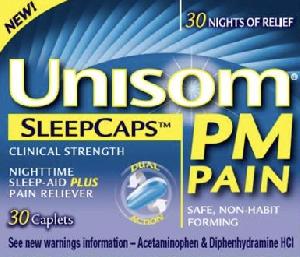Unisom PM Pain Interactions
There are 561 drugs known to interact with Unisom PM Pain (acetaminophen/diphenhydramine), along with 11 disease interactions, and 2 alcohol/food interactions. Of the total drug interactions, 23 are major, 523 are moderate, and 15 are minor.
- View all 561 medications that may interact with Unisom PM Pain
- View Unisom PM Pain alcohol/food interactions (2)
- View Unisom PM Pain disease interactions (11)
Most frequently checked interactions
View interaction reports for Unisom PM Pain (acetaminophen / diphenhydramine) and the medicines listed below.
- Advil (ibuprofen)
- Ambien (zolpidem)
- atorvastatin
- Benadryl (diphenhydramine)
- Celexa (citalopram)
- Cymbalta (duloxetine)
- Flexeril (cyclobenzaprine)
- gabapentin
- glipizide
- ketorolac
- lactulose
- Lexapro (escitalopram)
- meloxicam
- Nexium (esomeprazole)
- Omega-3 (omega-3 polyunsaturated fatty acids)
- omeprazole
- ondansetron
- oxycodone
- pantoprazole
- Paxil CR (paroxetine)
- pravastatin
- Probiotic Formula (bifidobacterium infantis / lactobacillus acidophilus)
- Spiriva (tiotropium)
- tramadol
- trazodone
- valacyclovir
- Vitamin C (ascorbic acid)
- Vitamin D3 (cholecalciferol)
- vitamin e
- Wellbutrin XL (bupropion)
Unisom PM Pain alcohol/food interactions
There are 2 alcohol/food interactions with Unisom PM Pain (acetaminophen / diphenhydramine).
Unisom PM Pain disease interactions
There are 11 disease interactions with Unisom PM Pain (acetaminophen / diphenhydramine) which include:
- alcoholism
- liver disease
- depression
- PKU
- anticholinergic effects
- asthma/COPD
- cardiovascular
- renal/liver disease
- glaucoma
- liver disease
- resp depression
More about Unisom PM Pain (acetaminophen / diphenhydramine)
- Unisom PM Pain consumer information
- Compare alternatives
- Drug images
- Side effects
- Dosage information
- During pregnancy
- Drug class: analgesic combinations
- En español
Related treatment guides
Drug Interaction Classification
| Highly clinically significant. Avoid combinations; the risk of the interaction outweighs the benefit. | |
| Moderately clinically significant. Usually avoid combinations; use it only under special circumstances. | |
| Minimally clinically significant. Minimize risk; assess risk and consider an alternative drug, take steps to circumvent the interaction risk and/or institute a monitoring plan. | |
| No interaction information available. |
See also:
Further information
Always consult your healthcare provider to ensure the information displayed on this page applies to your personal circumstances.


